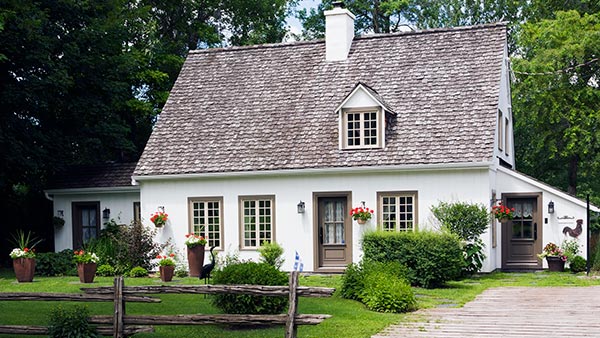Older homes: Hidden gems, or hidden pitfalls?

A careful look before you buy can keep your love affair with an older home intact.
Buying an older home can be appealing for many people. Older homes are usually found in established neighborhoods, have an abundance of character and are often one of a kind. However, hidden expenses could accompany all that charm.
Let’s explore some items to keep in mind when purchasing an older home.
FOUNDATION ISSUES
Foundation issues can be caused by the normal deterioration that comes with age, constantly wet soil, tectonic activity, hydrostatic water pressure or tree roots. A structural engineer would be best suited to assess damage and create a repair plan.
Items to look for:
Cracks in the foundation interior or exterior walls
Evidence of previous foundation repairs that could indicate ongoing issues
Uneven floors
Windows that are difficult to open
FAILING ROOF
At some point every home will need roof maintenance or replacement. How long a roof can last depends on many factors including roofing materials, weather, maintenance record and installation quality.
Items to look for:
Missing shingles or tiles
Loss of granules from the shingle
Moss or discoloration
Leaks or moisture in your attic
DANGEROUS OR OUTDATED BUILDING MATERIALS
Older homes may have dangerous materials that are no longer used and could be hazardous to your family. It could be costly to replace those items due to extra precautions the workers would need to use to remove the hazardous materials. It is also a good idea to ask your real estate agent what concerns to look for in your area.
Items to look for:
Asbestos
Galvanized plumbing
Non-grounded outlets
Lead paint
Clay drainage pipes
Bituminous fiber pipes
OBSOLETE ELECTRICAL
With all the technology we use daily, the electrical system in old homes cannot typically keep up. Older homes may have partial or entire electrical systems that are unpowered or even unsafe. If a home still has knob and tube (insulated with wool versus a sturdier coating) or aluminum wiring, you may find it difficult to get homeowners insurance.
Items to look for:
PLUMBING ISSUES
Older homes can have countless concerns with plumbing that could be expensive and problematic. Lead pipes could affect drinking water safety; polybutylene plastic pipes tend to corrode, crack and leak over time when exposed to bleach and other cleaning products; and galvanized pipes can be toxic when they lose their zinc coat. In addition, old trees can grow deep roots that can obstruct the plumbing system.
Items to look for:
Low water pressure
Slow draining sinks, bathtubs and showers
Leaky faucets
AGED MECHANICAL EQUIPMENT
Mechanical systems can be very expensive to replace and need routine service for a long life. Such systems include furnace, air-conditioning unit, water heaters and pool equipment. Improperly maintained water heaters and air conditioners can leak, damaging your flooring and anything below the unit.
Items to look for:
Unevenly heated/cooled rooms
Loud furnace or water heater
Puddling around water heater
MORE INFORMATION
Other items to consider are the materials used to build the home. While plaster walls can be appealing, they are less common today, so finding the materials and experienced contractors to repair them may be difficult. Brick homes eventually need their mortar repaired, which can be costly depending on the size of the home. If your home is designated as historic or in a historic preservation district, there may be additional rules to follow and approvals to obtain prior to renovation.
If you are considering an older home, obtain a home inspection by a qualified professional and discuss your situation with your independent insurance agent to make sure you have the appropriate coverages to protect your home investment.
This loss control information is advisory only. The author assumes no responsibility for management or control of loss control activities. Not all exposures are identified in this article. Contact your local, independent insurance agent for coverage advice and policy service.







